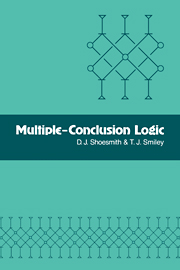Book contents
4 - Axiomatisability
Published online by Cambridge University Press: 06 July 2010
Summary
Multiple-conclusion calculi
The informal axiomatic method tries to relegate everything controversial in a theory to its axioms, and so requires that deduction from them shall be uncontroversial: given a putative proof of something from the axioms it must be an effective matter to decide whether it really is one or not. The analogous condition for a calculus governed by rules of inference is that there should be an effective procedure for deciding, for any X and Y, whether a putative proof from X to Y by the rules really is one or not. Naturally this decision procedure presupposes that information about X and Y is forthcoming. Thus we envisage a set of instructions which, when presented with a finite tree of formulae, determines a computation that proceeds algorithmically except that from time to time questions of the form ‘is A in X?’ or ‘is A in Y?’ may be asked, whereupon the correct answer is assumed to be supplied by some external agency or ‘oracle’ (cf. Rogers, 1967, Sections 9.2 and 15.1). The computation is to end with a verdict as to whether or not the given tree is a proof from X to Y.
To make this condition precise in terms of the classical theory of recursiveness we need to assume a countable (i.e. finite or countably infinite) universe of formulae, and an effective numbering - a Gödel numbering - of them. We write An for the formula with Gödel number n.
- Type
- Chapter
- Information
- Multiple-Conclusion Logic , pp. 57 - 71Publisher: Cambridge University PressPrint publication year: 1978



